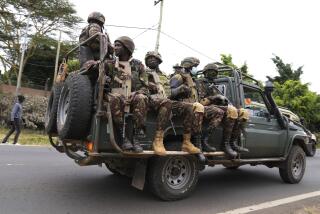Kenya Accuses U.S. of Interference, Aiding Subversives : Unrest: Nairobi reacts to American criticism of a political crackdown. Violent protests spread beyond the capital for the first time.
- Share via
NAIROBI, Kenya — The Kenyan government, firing back at American protests over a crackdown on opposition leaders, on Monday accused the United States of “gross interference in the affairs of this country” and of assisting subversives “bent on destabilizing the constitutionally elected government of Kenya.”
The charges, made in an unsigned item issued through the official Kenya News Agency, were the strongest yet in an escalating war of words between American officials and Kenyan leaders over the government’s intense campaign against political dissent. It came during the third day of riots sparked by an impromptu pro-democracy rally Saturday in Nairobi.
The rally followed a weeklong government crackdown on Kenya’s incipient opposition movement. Five leading opposition spokesmen, including two former Cabinet ministers and the editor of the Nairobi Law Monthly, were jailed Wednesday and Thursday after speaking out in favor of multi-party elections.
On Sunday, American diplomats confirmed that one opposition figure still being sought by police had requested and been granted “temporary asylum” inside the embassy. That man is Gibson Kamau Kuria, 43, a lawyer and former detainee known for his defense of dissidents in the Kenyan courts.
According to a statement released by the embassy, Kuria entered the building early Saturday morning and “expressed a desire to leave the country.” Since then, American officials have been negotiating with Kenyan authorities for his departure.
Over the previous week, the embassy had issued two statements expressing U.S. “distress” over the political crackdown.
The Kenyan statement issued Monday took note of Kuria’s refuge in the embassy by stating that the United States had “gone to the extent of harboring individuals sought by the law for their criminal and subversive activities.”
The statement went on to say: “The government of Kenya wishes to protest in the strongest terms against the unwarranted interference in Kenya’s internal affairs by the embassy of a friendly country.”
In Washington, Herman J. Cohen, the assistant secretary of state for African affairs, lodged a protest with Kenyan Ambassador Denis Afande over the criticism.
“We protested the language they have been using against our ambassador,” said a State Department official who spoke on the condition he not be identified by name. The official said Washington is particularly concerned with the implication by Kenyan officials that the United States is somehow fueling the demonstrations.
Meanwhile, for the first time, violent protests spread beyond Nairobi. Confrontations between police and rock-throwing mobs were reported in the towns of Nyeri, Nakuru and Muranga, all within 100 miles of Nairobi.
Police and paramilitary troops battled mobs in several slum neighborhoods ringing Nairobi. Riot police were seen in several places firing tear gas and beating demonstrators with clubs in their attempts to quell the violence.
Although many demonstrators flashed a two-fingered salute, commonly taken here to mean support of a multi-party system, most of the rioting seemed to be more an expression of frustration with generally declining economic conditions in this traditionally stable African country.
President Daniel Arap Moi, whose Kenya African National Union, or KANU, is the only legal political party in Kenya, was reported late Monday to be returning home from a summit of African leaders in Ethiopia, where he had arrived Monday morning.
Press reports here set the number of confirmed deaths from the weekend’s rioting at three. At least two more were killed Monday.
The disturbances began Saturday afternoon when a small group of demonstrators attempted to hold an informal rally downtown in favor of changing Kenya’s one-party political system to a multi-party democracy. Crowds gathered and eventually attacked with rocks an unmarked car carrying plainclothes security officers. As more people gathered, the rioting spread to a nearby bus station.
On Sunday, squads of riot police seemed to be largely successful in controlling outbreaks of violence. But Monday, violence erupted in several neighborhoods at once. In one place, rioters burned a bus and used rocks and burning tires to build barricades.
More to Read
Sign up for Essential California
The most important California stories and recommendations in your inbox every morning.
You may occasionally receive promotional content from the Los Angeles Times.













